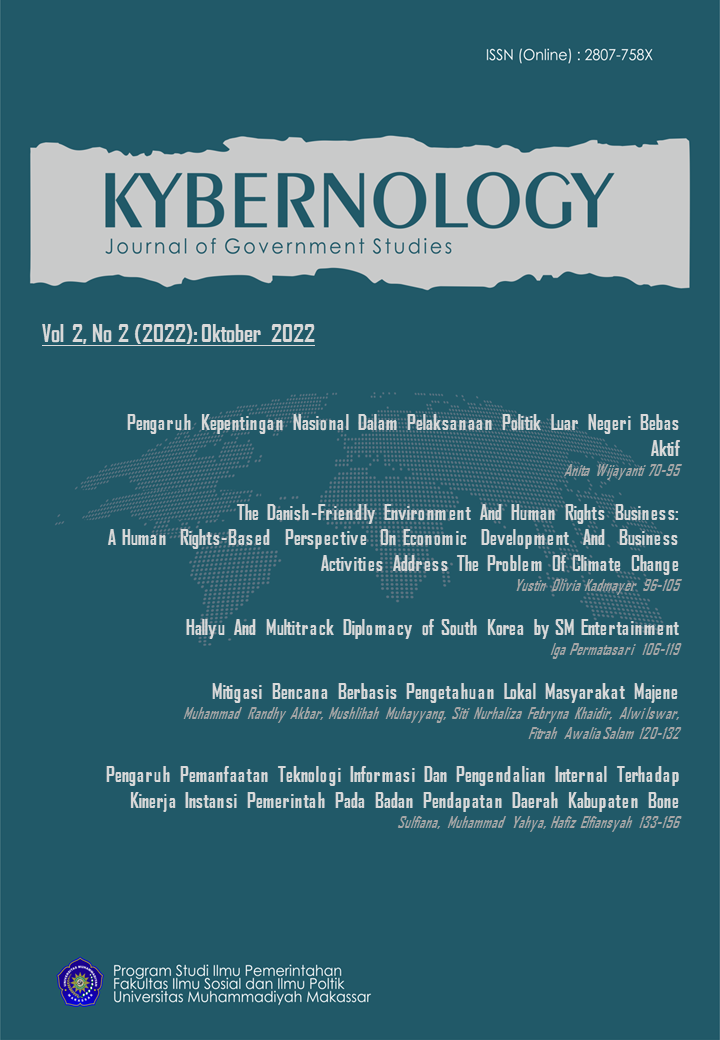The Danish-Friendly Environment And Human Rights Business: A Human Rights-Based Perspective On Economic Development And Business Activities Address The Problem Of Climate Change
DOI:
https://doi.org/10.26618/kjgs.v2i2.9580Keywords:
Climate Change, The Danish-Friendly Environment, Human Rights BusinessAbstract
This paper aims to find address the problem of climate change through the Danish-friendly environment and human rights business. The biggest causes for climate change derive from aggressive business and human being activities. The impacts of climate change are direct and indirect linked to human rights. Denmark is categorized as the most friendly environment country in 2022. This achievement is a reward for Denmark which has had a development climate policy since the 70s through the green energy transition. Denmark developed its climate policy into business. The business is a friendly-environment and human rights. The development theory is implemented in this paper to answer the development of the Danish climate policy.
References
Biotechnology Innovation Organization. (2022). What is Biotechnology? Retrieved from https://www.bio.org/what-biotechnology. Accessed on 19 November 2022.
Britannica, The Editors of Encyclopaedia and Riley, Patrick. "Timeline of Climate Change". Encyclopedia Britannica, 24 Feb. 2022, https://www.britannica.com/story/timeline-of-climate-change. Accessed 19 November 2022
Dikeman, Neal. (2015). What is Cleantech? Retrieved from https://www.cleantech.org/what-is-cleantech/ Accessed on 19 November 2022
Dunlap, R. E., & York, R. (2008). The globalization of environmental concern and the limits of the postmaterialist values explanation: Evidence from four multinational surveys. Sociological Quarterly, 49(3), 529–563. https://doi.org/10.1111/j.1533-8525.2008.00127.x
Emhardt, A. D. (2014). Climate Change and the Inuit: Bringing an Effective Human Rights Claim to the United Nations. Indiana International & Comparative Law Review, 24(2), 515–546. https://doi.org/10.18060/18274
Halperin, S. (2018). Development Theory. Encyclopedia Britannica. Retrieved from https://www.britannica.com/topic/development-theory Accessed on 20 November 2022.
Ministry of Foreign Affairs of Denmark. Denmark is a Laboratory for Green Solutions. Retrieved from https://denmark.dk/innovation-and-design/green-solutions Accessed on 19 November 2022
Ministry of Foreign Affairs of Denmark. Society and Business: Doing Business in Denmark. Retrieved from https://denmark.dk/society-and-business/business-environment Accessed on 06 July 2022
Prakoso, Septyanto Galan. (2019). An Analysis of Denmark’s Soft Power Diplomacy in Indonesia (A Study on Environmental Management Cooperation in Indonesia). Politica Vol. 10 No. 1 Mei
United Nation. 2019. Climate Action: Causes and Effects of Climate Change. Retrieved from https://www.un.org/en/climatechange/science/causes-effects-climate-change. Accessed 19 November 2022.
Scheffran, J., & Battaglini, A. (2011). Climate and conflicts: The security risks of global warming. Regional Environmental Change, 11(SUPPL. 1), 27–39. https://doi.org/10.1007/s10113-010-0175-8
United Nations Human Rights, Office of The High Commissioner. (2022). Development and human rights: OHCHR and the right to development. Retrieved from https://www.ohchr.org/en/development/development-and-human-rights Accessed on 19 November 2022.
World Population Review. (2022). Most Environmentally Friendly Countries 2022. Retrieved from https://worldpopulationreview.com/country-rankings/most-environmentally-friendly-countries. Accessed on 19 November 2022





